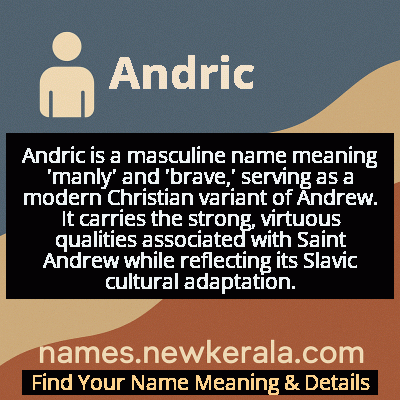Andric Name Meaning & Details
Origin, Popularity, Numerology Analysis & Name Meaning of Andric
Discover the origin, meaning, and cultural significance of the name ANDRIC. Delve into its historical roots and explore the lasting impact it has had on communities and traditions.
Name
Andric
Gender
Male
Origin
Christian
Lucky Number
4
Meaning of the Name - Andric
Andric is a masculine name meaning 'manly' and 'brave,' serving as a modern Christian variant of Andrew. It carries the strong, virtuous qualities associated with Saint Andrew while reflecting its Slavic cultural adaptation.
Andric - Complete Numerology Analysis
Your Numerology Number
Based on Pythagorean Numerology System
Ruling Planet
Uranus (Rahu)
Positive Nature
Strong sense of order, loyal, practical, and disciplined.
Negative Traits
Stubborn, overly serious, rigid, and prone to feeling restricted.
Lucky Colours
Blue, gray.
Lucky Days
Saturday.
Lucky Stones
Blue sapphire.
Harmony Numbers
1, 7, 8.
Best Suited Professions
Managers, engineers, accountants, organizers.
What People Like About You
Dependability, discipline, practicality.
Famous People Named Andric
Ivo Andrić
Writer and Diplomat
Nobel Prize in Literature (1961)
Andrić Goran
Film Director
Award-winning director of 'Pretty Village, Pretty Flame'
Marko Andrić
Basketball Player
Professional athlete representing Serbia internationally
Name Variations & International Equivalents
Click on blue names to explore their detailed meanings. Gray names with will be available soon.
Cultural & Historical Significance
The name's evolution from Andrew to Andric demonstrates the fascinating interplay between religious tradition and linguistic adaptation. As Christianity spread through Slavic territories, names like Andrew underwent phonetic and morphological changes to fit local languages, resulting in distinctive variants like Andric. This process reflects broader patterns of cultural synthesis, where universal Christian traditions merged with specific regional identities. Today, Andric represents this rich historical tapestry—a name that simultaneously honors Christian martyrs, celebrates Slavic linguistic heritage, and embodies the enduring human quest for meaning and identity across generations.
Extended Personality Analysis
Individuals bearing the name Andric typically exhibit a compelling blend of traditional masculinity and intellectual sophistication. They often possess natural leadership qualities combined with a reflective, analytical nature that allows them to approach challenges with both courage and wisdom. This combination makes them particularly effective in positions requiring both decisive action and careful consideration. Their strength is typically tempered by emotional intelligence, enabling them to connect with others while maintaining their principled stance. Andrics are often perceived as pillars of stability in their communities—reliable, duty-bound, and committed to upholding their values.
Beyond their evident strength and reliability, Andrics frequently demonstrate remarkable adaptability and cultural awareness. Growing up with a name that bridges multiple traditions often instills in them an appreciation for diverse perspectives and the ability to navigate complex social situations. They tend to be excellent mediators and bridge-builders, capable of understanding different viewpoints while remaining true to their core principles. This psychological profile suggests individuals who are both grounded in tradition and open to innovation, making them well-suited for roles that require balancing heritage with progress. Their personality reflects the name's historical journey—rooted in ancient traditions yet continually evolving to meet contemporary challenges.
Modern Usage & Popularity
In contemporary naming practices, Andric maintains a distinctive presence that balances traditional appeal with modern sophistication. While not ranking among the most popular names globally, it enjoys consistent usage particularly in Slavic communities and among families seeking names with strong cultural and religious heritage. The name's popularity has remained relatively stable over recent decades, with occasional surges in interest following cultural events or the achievements of notable bearers. In multicultural societies, Andric appeals to parents looking for names that honor Christian traditions while offering a distinctive alternative to more common biblical names. Its usage patterns reflect broader trends toward names that combine historical depth with unique phonetic qualities, making it particularly attractive to educated, culturally-aware families who value both tradition and individuality in naming choices.
Symbolic & Spiritual Meanings
Symbolically, Andric represents the enduring power of cultural transmission and the synthesis of different traditions. The name serves as a metaphorical bridge between Eastern and Western Christian traditions, between ancient apostolic heritage and contemporary identity, and between individual personality and collective cultural memory. It symbolizes masculine virtue redefined for modern times—strength that incorporates empathy, courage that includes reflection, and leadership that values collaboration. The name evokes the image of a foundation stone—something solid and reliable upon which communities and families can build. In a broader sense, Andric represents the idea that identity is both inherited and created, that we carry forward the wisdom of our ancestors while contributing our own chapter to the ongoing story of our culture and faith.

